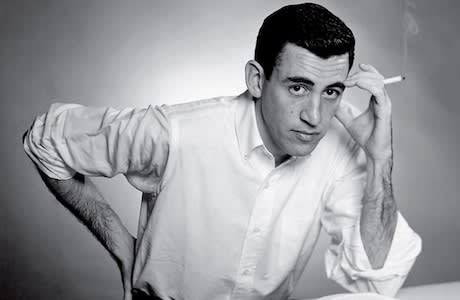How exactly do you make a documentary about a well-known recluse such as J.D. Salinger, a man that spent the latter half of his life purposely evading the public eye? According to director Shane Salerno, it's as easy as blending an onslaught of talking heads, staged re-enactments and the occasional bit of archival footage, occasionally tossing in a tidbit of unsubstantiated gossip for good measure. While this generic, well-trod structure works (functionally) for more accessible subjects, in the case of Salerno's documentary, Salinger, it's flimsy and insubstantial, being as illusive as its subject when it comes to substance.
After bringing the world The Catcher in the Rye, and subsequently putting an end to publishing his works in 1965, the acclaimed author spent the remainder of his years (he passed away at the age of 91 in 2010) evading the public eye, living a meagre life in Cornish, New Hampshire. Devoted fans and paparazzi attempted to seek out Salinger for decades, looking to seek counsel, snap a photo or catch a scoop on what he had been doing all these years.
It's not so much that the man was an actual hermit or "recluse"; it's simply that Salinger wanted to be left alone to write and live a life free from spectacle. We learn that he was known to frequent the town of Cornish, often shopping for sundries or visiting the homes of local friends for dinner.
Rather than focus the film's bloated 135-minute runtime on a celebration of the author's life and accolades, Salerno is hell-bent on exposing the reasons for how and why Salinger renounced the world and sought solace in Cornish. The fact that Salinger decided to stop publishing his work is also portrayed as a terrible affront against the world, which makes Salerno's film present itself as a subtle mockery of Salinger.
Salerno also devotes a substantial amount of time to people that stalked, accosted or preyed upon Salinger when he was trying to retrieve his mail or walk his dog. Even worse than acknowledging this sort of behaviour and giving it a fleeting celebrity slant in a documentary context, Salerno doesn't have an evident position against these actions and, sadly, a positive light is cast upon these individuals as they share their "moments" with Salinger.
Beyond this crass exploitation of sleazy opportunists, the string of talking heads becomes redundant, as Gore Vidal, Ben Yagoda, Phoebe Hoban and various Salinger biographers (read: experts) make their opinions known to the world. Most curiously is the appearance of a handful of celebrities who share their opinions of J.D. Salinger without any form of context. Why the personal thoughts from John Cusack, Edward Norton, Philip Seymour Hoffman or Martin Sheen — people that have never met the man or had any meaningful exchanges with him — were included is utterly puzzling, reiterating the strained sensibility of it all.
More interestingly, the film recounts Salinger's upbringing, leading up to his time in the military and subsequent life as an author. The segment on his military career is extremely protracted, which makes sense given Salerno's fixation on making the war the key to everything Salinger subsequently went on to do with his life. An idea emerges that The Catcher in the Rye is a war novel and, given some of the evidence put forth, it isn't something that can be easily dismissed.
Less interestingly, the film goes off on a salacious tangent, exploring Salinger's personal life, such as the relationships he had with teenaged girls while in his 30s. Of note were his associations with Jean Miller, who inspired his story For Esmé, and Joyce Maynard, who lived with Salinger in the '70s. The latter would eventually scorn the author and write a book about the experience.
After enduring this tenuous assortment of thoughts and assertions, most of which are handled with the utmost superficiality, we learn that Salinger had been actively writing since 1965. Prior to his death, a trust foundation was set up to not only protect the copyright of Catcher, preventing it from ever being adapted to film, but release his unpublished works, beginning in 2015.
It's just a shame that it took so long for Salerno to reveal the only interesting tidbit of information presented in this bloated, television-quality documentary.
(eOne)After bringing the world The Catcher in the Rye, and subsequently putting an end to publishing his works in 1965, the acclaimed author spent the remainder of his years (he passed away at the age of 91 in 2010) evading the public eye, living a meagre life in Cornish, New Hampshire. Devoted fans and paparazzi attempted to seek out Salinger for decades, looking to seek counsel, snap a photo or catch a scoop on what he had been doing all these years.
It's not so much that the man was an actual hermit or "recluse"; it's simply that Salinger wanted to be left alone to write and live a life free from spectacle. We learn that he was known to frequent the town of Cornish, often shopping for sundries or visiting the homes of local friends for dinner.
Rather than focus the film's bloated 135-minute runtime on a celebration of the author's life and accolades, Salerno is hell-bent on exposing the reasons for how and why Salinger renounced the world and sought solace in Cornish. The fact that Salinger decided to stop publishing his work is also portrayed as a terrible affront against the world, which makes Salerno's film present itself as a subtle mockery of Salinger.
Salerno also devotes a substantial amount of time to people that stalked, accosted or preyed upon Salinger when he was trying to retrieve his mail or walk his dog. Even worse than acknowledging this sort of behaviour and giving it a fleeting celebrity slant in a documentary context, Salerno doesn't have an evident position against these actions and, sadly, a positive light is cast upon these individuals as they share their "moments" with Salinger.
Beyond this crass exploitation of sleazy opportunists, the string of talking heads becomes redundant, as Gore Vidal, Ben Yagoda, Phoebe Hoban and various Salinger biographers (read: experts) make their opinions known to the world. Most curiously is the appearance of a handful of celebrities who share their opinions of J.D. Salinger without any form of context. Why the personal thoughts from John Cusack, Edward Norton, Philip Seymour Hoffman or Martin Sheen — people that have never met the man or had any meaningful exchanges with him — were included is utterly puzzling, reiterating the strained sensibility of it all.
More interestingly, the film recounts Salinger's upbringing, leading up to his time in the military and subsequent life as an author. The segment on his military career is extremely protracted, which makes sense given Salerno's fixation on making the war the key to everything Salinger subsequently went on to do with his life. An idea emerges that The Catcher in the Rye is a war novel and, given some of the evidence put forth, it isn't something that can be easily dismissed.
Less interestingly, the film goes off on a salacious tangent, exploring Salinger's personal life, such as the relationships he had with teenaged girls while in his 30s. Of note were his associations with Jean Miller, who inspired his story For Esmé, and Joyce Maynard, who lived with Salinger in the '70s. The latter would eventually scorn the author and write a book about the experience.
After enduring this tenuous assortment of thoughts and assertions, most of which are handled with the utmost superficiality, we learn that Salinger had been actively writing since 1965. Prior to his death, a trust foundation was set up to not only protect the copyright of Catcher, preventing it from ever being adapted to film, but release his unpublished works, beginning in 2015.
It's just a shame that it took so long for Salerno to reveal the only interesting tidbit of information presented in this bloated, television-quality documentary.




